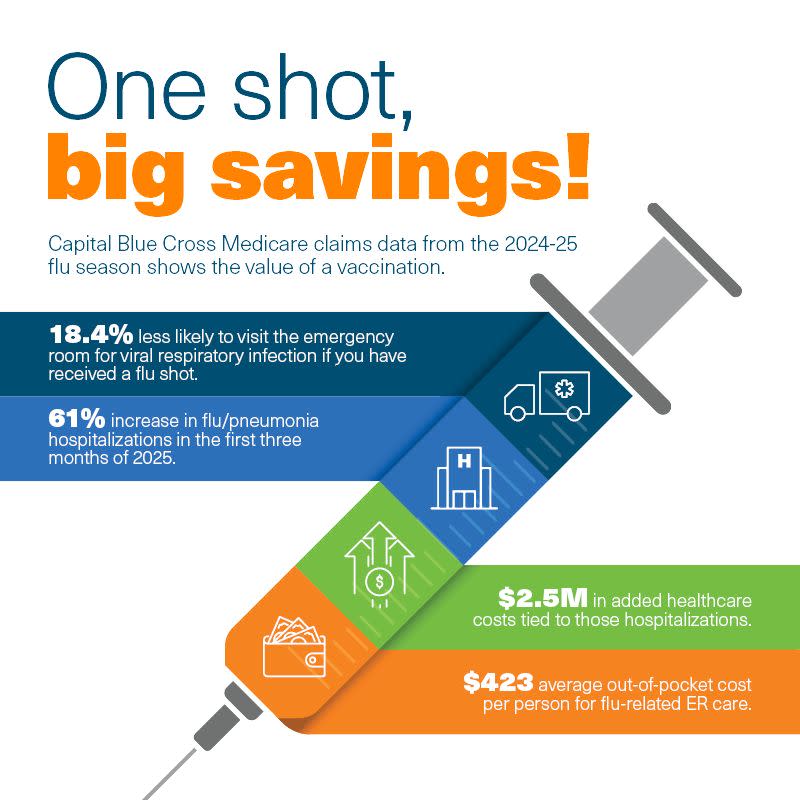
Flu shot offers proven health and cost benefits, Capital Blue Cross finds
For seniors age 65 and older, getting an annual flu shot can do more than help avoid a few days of illness – it can keep them out of the hospital and save them money, according to new Capital Blue Cross findings that highlight the value of flu vaccinations.
 Capital data from the 2024-25 flu season showed that seniors who received their flu shots were nearly 20% less likely to visit the emergency room for viral respiratory infections than those who were not vaccinated. By avoiding the emergency room, seniors also avoided out-of-pocket costs averaging $423 per ER visit and $765 when an ER visit resulted in a hospital admission.
Capital data from the 2024-25 flu season showed that seniors who received their flu shots were nearly 20% less likely to visit the emergency room for viral respiratory infections than those who were not vaccinated. By avoiding the emergency room, seniors also avoided out-of-pocket costs averaging $423 per ER visit and $765 when an ER visit resulted in a hospital admission.
“Vaccines aren’t just about fighting the flu – they’re about preventing serious illness that can lead to emergency care or hospitalization,” said Dr. Shikha Doomra, Clinical Medical Director at Capital Blue Cross. “This data shows that skipping the flu shot can have real consequences, especially for older adults.”
U.S. flu hospitalizations in 2024-25 were the highest in more than a decade, according to the Centers for Disease Control and Prevention. In January through March 2025, which roughly coincides with peak flu season, Capital Blue Cross saw flu and pneumonia-related hospital admissions among its Medicare Advantage members rise by more than 60% compared to the same period in 2024. That added $2.5 million in healthcare costs.
With another flu season approaching, Capital Blue Cross is encouraging members to protect their health – and wallets – by getting a flu shot this fall.
Flu season typically begins in the fall with peak flu activity usually occurring in the winter. Getting vaccinated early in the fall gives your body time to build strong protection, said Dr. Doomra.
While flu vaccines are especially critical for older adults, preventive care is important for everyone, Dr. Doomra said. In addition to the flu shot, vaccines for RSV and pneumonia can offer added protection – particularly for those with underlying health conditions or weakened immune systems.
“Whether you're a senior, a caregiver, or simply preparing for the season ahead, taking a few simple steps now can help you stay healthier through the fall and winter months,” Dr. Doomra said.
Here are simple steps to ensure you’re prepared.
Know what vaccines you need.
The CDC recommends a flu shot for everyone age 6 months and older. RSV and pneumonia vaccines also are available for eligible individuals, including older adults and those with certain health conditions. Talk to your doctor to find out which vaccines are right for you.
Find a convenient location.
Vaccines are available at doctor’s offices, pharmacies, clinics, and health departments. Many offer online scheduling.
Check your insurance coverage.
Flu, pneumonia, and RSV vaccines may be covered under your health plan, but double check to make sure. If you don’t have health insurance, you may still be able to get vaccinated at low or no cost through local health departments, community health clinics, or federally funded programs.
For more details on who should get vaccinated, where to go, and how to check your coverage, visit the Capital Journal.
Images

Additional Info
Media Contact : Jeff Wirick

